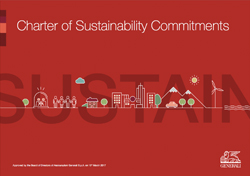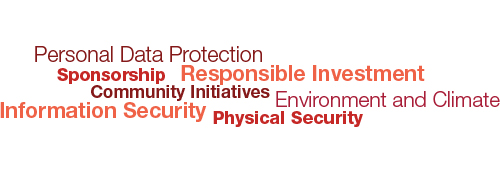This page contains Consolidated Non-Financial Statement information
- We run our business in compliance with the law, internal regulations and professional ethics.
- We operate in a sustainable manner in all our operations and support the community in addition to our daily activities. These are the two pillars on which our vision of sustainability is based::
This vision is outlined in the Charter of Sustainability Commitments approved by the Board of Directors of Assicurazioni Generali in 2017 which renews the commitment of the Group with respect to its stakeholders and the society in general. “We contribute towards a healthy, resilient and sustainable society where people can develop and flourish. This is how we live our role as a corporate citizen, creating long-term value for our stakeholders".
“We contribute towards a healthy, resilient and sustainable society where people can develop and flourish. This is how we live our role as a corporate citizen, creating long-term value for our stakeholders".
- We have a collection of Group policies and guidelines published within the website of the Group which support our operations in a sustainable and responsible manner.
https://www.generali.com/info/download-center/policies
www.generali.com/en/our-responsibilities
Code of Conduct
The Code of Conduct defines the basic behavioural principles which all the personnel of the Group is required to comply with: these principles are outlined in specific guidelines that refer, for example, to the promotion of diversity and inclusion as well as the management of conflicts of interest, personal data protection and corruption prevention.
We have made available communication channels (Group Compliance Helpline) to our employees, customers and suppliers, even in anonymous format, which ensure an objective and independent management of reports of actions which violate ethics, our principles and our regulations, in accordance with a whistleblowing policy which we have been applying for years. These channels are active 24 hours a day. We have also adopted a rigorous policy against retaliations.
Compliance. Building Trust
a global communications campaign which is also supported by a video message of the Chairman within the Group Portal as well as on the website of the Group and on YouTube in addition to a personal message to all employees from the Group CEO which emphasizes the importance of compliance for our success.
2 Compliance Week
aiming to promote both knowledge of the Compliance Management System as well as the importance of compliance and the concept of integrity in company operations.
We are committing to rendering our HR training system increasingly effective.
We continue to work in activities for creating awareness and training on the different themes of the Code.
The implementation of certain training programs - both online as well as in the classroom, combined with a global communication program - aims to create full awareness within employees of the importance of the Code and one's responsibility to report each violation that one becomes aware of. Everybody is encouraged to voice their concerns or request clarifications on any topic handled by the Code.
The Group Policy for the Environment and Climate
The Group Policy for the Environment and Climate contains the guiding principles for the strategies and objectives of environmental management.
The Responsible Investment Guideline codifies the responsible investment activities at a Group level.
In accordance with that declared in our Group Policy for the Environment and Climate, we have established a multi-dimensional approach to the environmental theme which considers:
Direct impact
In 2014, we have defined an objective for reducing our Carbon Footprint by 20% within 2020 (base year 2013).
Total emissions refer to 44% of the total Group employees in the following countries: Austria France, Germany, Italy, Czech Republic, Spain and Switzerland.
Total emissions mainly come from energy consumption. In 2017, the purchased renewable energy was equal to 74.6% of the total acquired energy.
Indirect impact
Our commitment to contributing towards the transition to a more sustainable economy and society is also expressed through a strategy which focuses, in particular, on insurance activities and investments.
With regard to investments, Generali, as asset owner (general account investment), commits to developing the following actions:
- green investments by 2020: investments in green sectors will be increased by € 3.5 billion (mainly through green bonds and green infrastructures). Generali will monitor the action plan annually to assess if it is being properly implemented and possibly raising the objectives
- positioning in coal-related activities: Generali will not make any new investments in businesses associated with the coal sector. With reference to the current exposure to the coal sector, equivalent to approximately € 2 billion, Generali will dispose of equity investments and gradually eliminate bond investments by bringing them to maturity or considering the possibility of investing them before maturity. The Group will allow exceptions only in those countries where the production of electrical energy and that for heating are still dependent on coal, without alternatives in the medium term. These exceptions currently represent a marginal portion of investments (equivalent to 0.02% of the general account).
With regard to underwriting, as for premiums related to non-Life products, Generali commits to developing the following actions:
- growth in green insurance: the percentage of the premium portfolio related to the renewable energy sector will be increased as well as the offering of products with environmental value (e.g. sustainable mobility and energy efficiency) for the retail market and SMEs
- positioning in coal-related activities: Generali ‘s current exposure to coal-related activities is minimal in relation to total non-Life premiums and primarily refers to countries where the economy and employment heavily depend on the coal sector. The Group will continue its policy of minimal insurance exposure.
In countries where the economy and employment heavily depend on the coal sector, Generali will engage issuers, clients and other stakeholders through constant dialogue. stakeholder.
Public commitment
In line with the commitments made when adhering to certain important international initiatives (Paris Pledge for Action, The Geneva Association - Climate Risk Statement, European Financial Services Round Table), we actively participate in work groups as well as national and international events pertaining to green finance, including the Italian National Dialogue on Sustainable Development promoted by UNEP and the Italian Ministry of the Environment. We have organized significant institutional events, including the presentation of the Interim Report by the High-Level Expert Group (European Commission) on sustainable finance in Italy.
https://www.generali.com/our-responsibilities/our-commitment-to-the-environment-and-climate, for additional environmental information
Ethical Code for suppliers
The Ethical Code for suppliers highlights the general principles for the correct and profitable management of relations with contractual partners.
The overall set of Group policies and guidelines contributes to ensure respect for human rights, particularly with reference to the Code of Conduct, the Responsible Investment Guideline and the Ethical Code for suppliers. In 2017, the Group has initiated a series of in-depth activities in order to identify areas and activities for improvement, and which will be completed in 2018.
We also have a structured internal Group regulatory system, regulated by the Generali Internal Regulation System Policy (GIRS).The Group policy cover the internal control system and governance as well as the risk management system - linked in particular to monitoring solvency (Solvency II) - in addition to the primary areas of financial and non-financial risk.
Corporate Governance and Share Ownership Report 2017

The primary risks of compliance are monitored by specific programs utilized throughout the Group.
We regularly monitor - by means of specific risk assessment activities - our exposure to these risks in order to minimize potential reputational and economic damages deriving from the violation of regulatory provisions, including those which aim to prevent corruption.
We condemn and combat all forms of corruption and financial crime.
